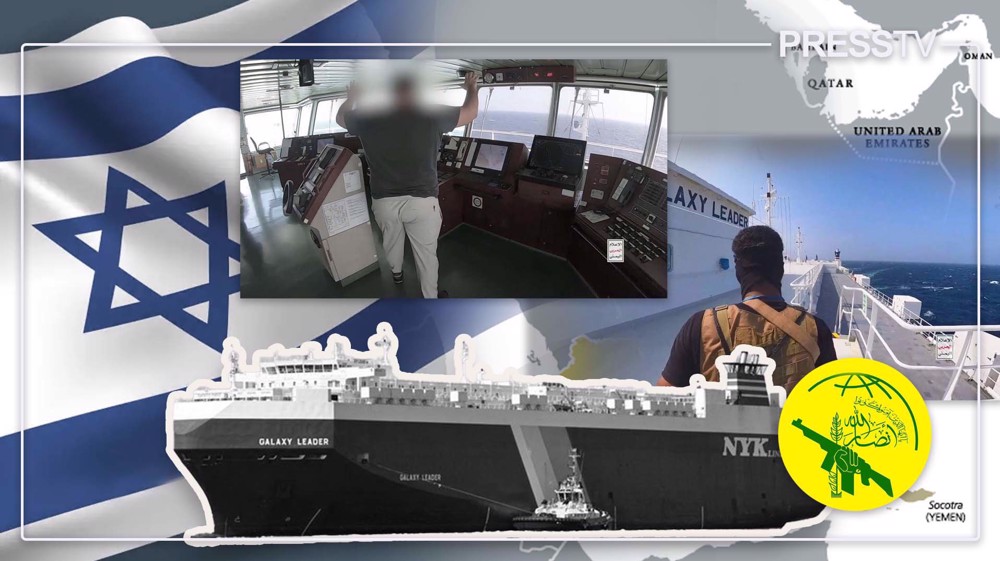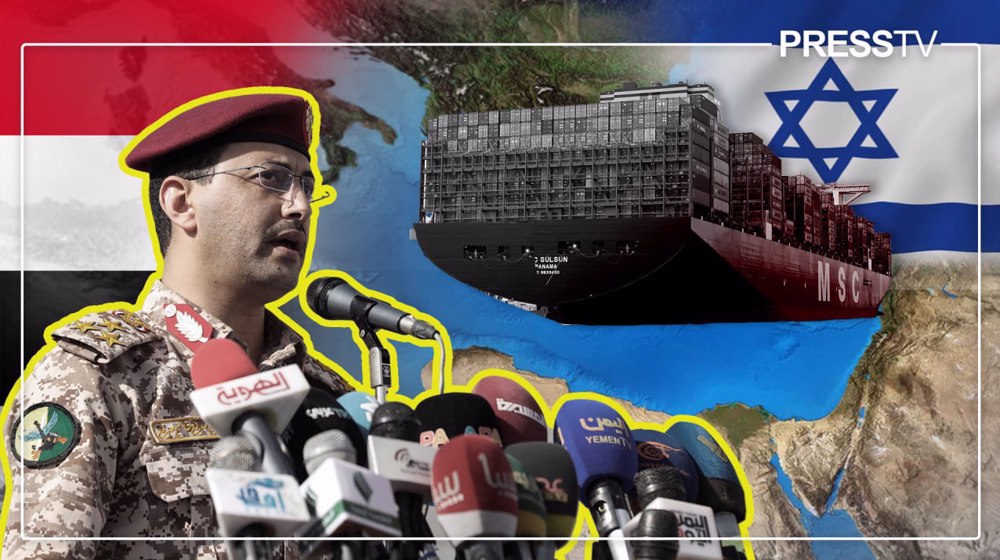Devil in deep sea: Bab-el-Mandeb Strait becomes too tight for Israeli vessels
By Ivan Kesic
In an extraordinary move, Yemen's Ansarallah resistance movement on Sunday seized an Israeli cargo ship and detained dozens of its crew members in the Red Sea.
It came after an earlier warning from the Yemeni resistance to block the passage of Israeli ships in response to the regime's genocidal campaign in the besieged Gaza Strip.
More than 14,000 Palestinians have been killed in Israeli aggression on the densely-populated territory since October 7, most of them women and children.
On Wednesday, both Hamas and the Israeli regime confirmed a four-day truce deal brokered by Qatar and Egypt, which experts see as a significant victory for the Palestinian resistance seven weeks since the Al-Aqsa Storm Operation.
The seizure of the Israeli vessel in the Red Sea came after a series of drone attacks by Yemeni armed forces against the occupying regime in recent weeks in a show of support and solidarity with the Palestinian resistance.
Yemeni resistance to Israel
Five days earlier, the leader of the Ansarallah resistance movement called on Arab countries and the Muslim world to adopt a clear stance in the face of Israel’s genocide in Gaza.
Abdul-Malik al-Houthi said the Yemeni forces are keeping a watchful eye on Israeli ships in the Red Sea, and in the Bab el-Mandab Strait in particular, as well as Yemeni territorial waters, calling for an end to Israeli aggression on Gaza.
The Ansarallah leader said the Israeli occupation "did not dare raise Israeli flags on its ships in the Red Sea," adding that "they camouflage, which indicates their fear and the effectiveness of our position."
Brigadier General Yahya Saree, the spokesman for the Yemeni armed forces, announced earlier in the day that the Arqb country's military units would target all ships owned or operated by Israeli companies or carrying the Israeli flag.
Yemen’s move, he said, is in support of Palestinians amid the Israeli regime's brutal onslaught on the besieged Gaza Strip.
He also called on all countries to withdraw their citizens working as crews on any such vessels operated by the Israeli regime, which was a clear warning about what was to come.
The 189-meter-long Galaxy Leader car carrier, traveling from the Mediterranean Sea to the Indian Ocean, was intercepted by small fast boats and boarded by uniformed armed personnel.
A group of masked forces rappelled from a helicopter carrying the Yemeni and Palestinian flags to the deck, ordering the ship crew to alter course to the Yemeni port of Al Hudaydah.
Hezam al-Assad, a member of Ansarallah's political bureau, said the seizure of the Israeli ship was "just the beginning of upcoming naval operations that will target Israel’s naval vessels, battleships, or commercial ships."
Strategic importance of move
Bab-el-Mandeb is a strait between Yemen and Africa, which connects the Red Sea and the Gulf of Aden, in a broader sense the Mediterranean Sea and the North Atlantic with the Indian Ocean.
The strait has great strategic importance because maritime trade passes through it between the ports of the Indo-Pacific and the Atlantic, that is, between Asia and the Western world.
Ship throughput is the same as that of the Suez Canal, about 20,000 a year or more than 50 a day, and both account for about 12 percent of global trade and 30 percent of container trade, worth over $1 trillion.
It is of even greater importance for the economy of the Israeli regime, because Asia (excluding Turkey) accounts for a quarter of its exports and a third of its imports, and most of this trade takes place precisely through Bab-el-Mandeb.
For these reasons, Djibouti hosts a large number of foreign military bases on the west coast of the strait, belonging to China, Japan, the United States, the United Kingdom, Germany, France, Italy, Spain, and Saudi Arabia.
Russia and India have also expressed their desire to open military bases there, and even the Israeli regime has been dabbling with the idea of establishing relations with Djibouti for several decades, but without any success.
On the same grounds, the Israeli regime today maintains relations with Eritrea, another country with a coast on the strait, as it did with Ethiopia before the country's independence.
Eritrea also hosts foreign military bases, operated by Russia and the United Arab Emirates, and Somalia is also home to a Turkish military base.
Regarding the east coast, in other words, Yemen, the southern part is under the control of the Southern Transitional Council (STC) loyal to the deposed Yemeni dictator Abdrabbuh Mansur Hadi and his Emirati, Saudi, and Western allies.
The northern part of the coast is under the control of Ansarallah, including the important port city of Al Hudaydah, for which fierce fighting took place from 2017 to 2021.
Despite the fact that several regional countries, the United States, France and even the Israeli regime participated in the battle for Al Hudaydah, Ansarallah forces prevailed and retained control of the city.
With the spectacular operation of seizing an Israeli ship, in front of the bases of the largest Western and Eastern powers, and with the presence of their navies, Ansarallah proved once again that the resistance movement is an important player.
VIDEO | Press TV's news headlines
Iran: US threat of sanctions on ICC over Israel arrest warrants 'shameful'
VIDEO | Gaza: A land of genocide, domicide and ecocide
EU arms Ukraine by using profits from frozen Russian assets
US halt to arms shipment to Israel too little too late: Rights advocates
VIDEO | Rafah on the brink
Lithuania says deployment of Western army trainers in Ukraine 'quite doable'
China’s Xi arrives in Hungary on 3rd leg of European tour










 This makes it easy to access the Press TV website
This makes it easy to access the Press TV website